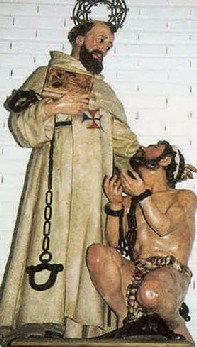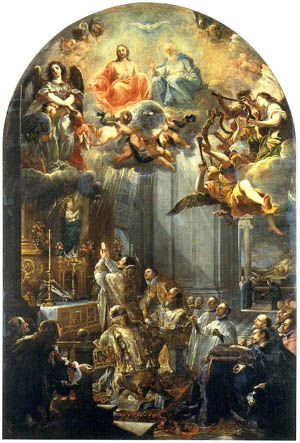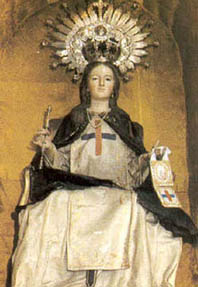 |
The Saint of the Day
St. John of Matha - February 8
Prof. Plinio Corrêa de Oliveira
Biographical selection:
St. John of Matha (1160-1213) was born of noble parents at Faucon in Provence, France. After a brilliant success in his studies at Paris, he became a priest.

St. John of Matha founded the Trinitarians to ransom captives and support the Crusades
|
At his first Mass, he had an inspiration to dedicate his life to the ransom of Catholic warriors made slaves by the Muslims in the Crusades.
To prepare himself for this work, he went to visit a hermit, St. Felix of Valois, to be instructed in the practice of perfection. When he revealed his plan, St. Felix was convinced that the design was from God, and offered to help him. Together they founded the Order of the Holy Trinity to ransom the captives. Soon, countless vocations came to the Order. The Trinitarians traveled with the Crusaders, teaching the soldiers, taking care of the sick, and dealing with the redemption of the captives.
St. John of Matha managed to free a great number of Catholic slaves in Morocco, Tunis, and Spain. On his second trip to Tunis in 1210, he suffered much from the infidels, who were enraged at his zeal and his success in exhorting the slaves to remain constant in their faith.
On his return with the 120 Catholics whom he had ransomed, he found that the Muslims had damaged the rudder of his ship and ripped its sails to prevent its safe arrival and cause the ship to perish at sea. But St. John of Matha, full of confidence in God, begged Him to be their pilot. He sewed together the cloaks of his companions and made new sails. Then, with a crucifix in his hands, he recited his Psalter as the ship sailed. They had a successful voyage and landed safely in the port of Ostia, near the mouth of the Tiber.
Comments of Prof. Plinio:
The Order of the Trinitarians founded by St. John of Matha was an extremely useful apostolate to maintain the Crusades in the elevated spirit intended by the Church when she convoked them. It was a most noble apostolate that indicates the close solidarity of this Saint with the movement of the Crusades.

The founding of the Trinitarian Order
John Carreno de Miranda, 1666
|
Today those who speak against the Crusades do a very bad thing. The true saints were cooperators with and enthusiasts of the Crusades. The main goal of the Trinitarians, which was to ransom the captives, also had a favorable effect on the Crusaders, who had less fear to be captured and remain slaves of the Moors for a long period of time, or even indefinitely. St. John of Matha and his Order gave them the hope to be ransomed and return to the fight. Therefore, the work of the Saint was a very important support for the Crusades.
All this is very beautiful, a crown of gold. But the precious stone inlaid in this crown was the last fact in the narration. St. John of Matha embarked on a journey to cross the Mediterranean with 120 men in a ship with torn and useless sails. He improvised by making new sails, but they were insufficient. He did everything he could to restore the destroyed sails, but he knew his efforts were not enough. So, he had recourse to God. He prayed, he chanted the psalms with a crucifix in his hand as the ship continued on its way.
You can imagine the varying sentiments of those liberated captives in the ship. At times, they experienced a movement of confidence and enthusiasm for the Saint and his bold faith; at other times, they would feel a real panic to be lost at sea and die. St. John of Matha had to preach to them to have confidence in God. It was an adventure based upon the faith of one man. When the episode was told and spread throughout Christendom, it generated a great surge of good spirit and desire to go to the Crusades.

Our Lady in the Trinitarian habit, Madrid
|
The principle that inspired St. John of Matha was the same that St. Ignatius of Loyola would formulate centuries later: Do everything as if it depended only on your action, then recognize that everything relies on God and not on you.
St. John of Matha applied this principle perfectly. He repaired the sails as well as he could and ordered the trip to go forward. At the same time, he prayed, recognizing that only God could make the voyage successful.
That vessel at sea, abandoned to its fate, reminds us of the fight to which we dedicate our lives. Our counter-revolutionary movement is also an abandoned ship, and the means we have to go ahead are nothing more than improvised sails in a small craft.
We should ask St. John of Matha and all saints who were in fights similar to ours, that they be spiritually present to help us in the dangers we will face so that we will do what we are supposed to do. As he did, we should sing prayers at the feet of Our Lady asking her that our ship arrive at a good port. That is to say, the complete defeat of the Revolution and the installation of the Reign of Mary on earth.


  | | Prof. Plinio Corrêa de Oliveira | |
The Saint of the Day features highlights from the lives of saints based on comments made by the late Prof. Plinio Corrêa de Oliveira. Following the example of St. John Bosco who used to make similar talks for the boys of his College, each evening it was Prof. Plinio’s custom to make a short commentary on the lives of the next day’s saint in a meeting for youth in order to encourage them in the practice of virtue and love for the Catholic Church. TIA thought that its readers could profit from these valuable commentaries.
The texts of both the biographical data and the comments come from personal notes taken by Atila S. Guimarães from 1964 to 1995. Given the fact that the source is a personal notebook, it is possible that at times the biographic notes transcribed here will not rigorously follow the original text read by Prof. Plinio. The commentaries have also been adapted and translated for TIA’s site.
|
Saint of the Day | Home | Books | CDs | Search | Contact Us | Donate

© 2002- Tradition in Action, Inc. All Rights Reserved
|
 |

|